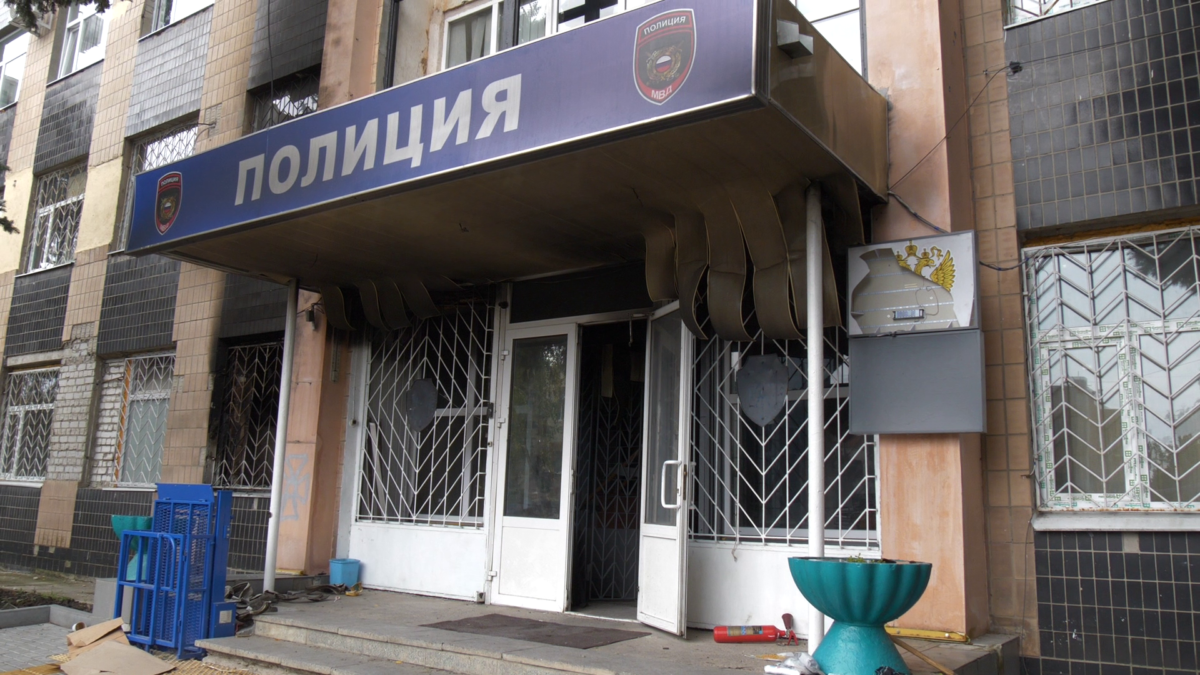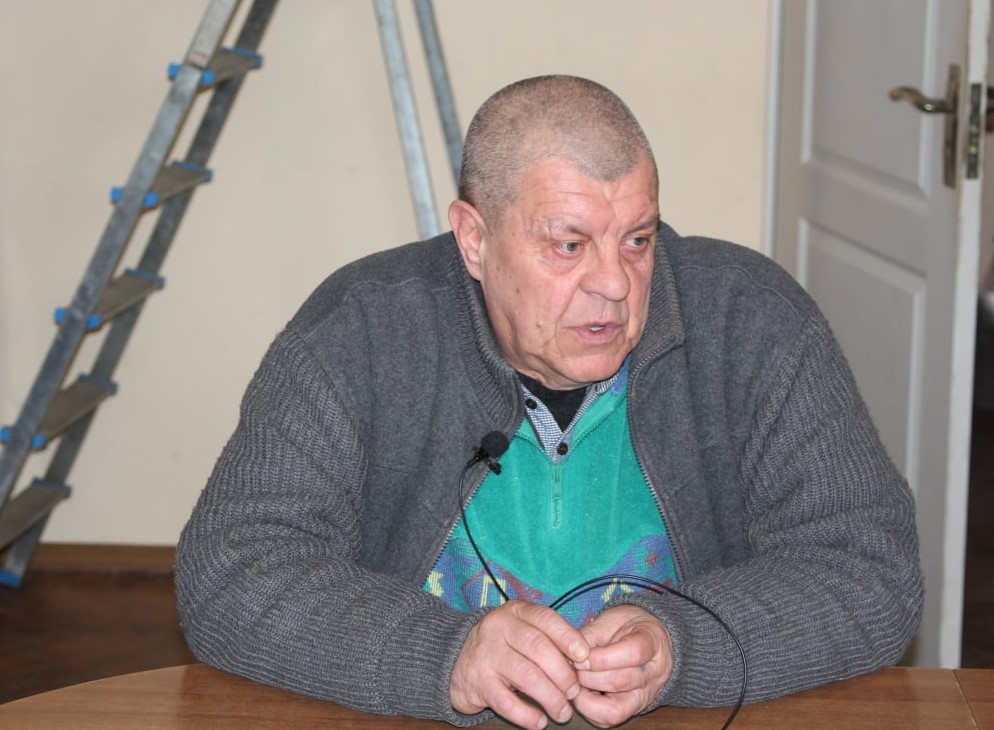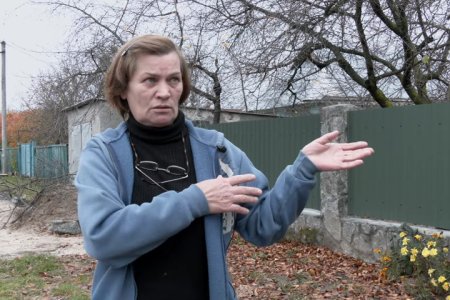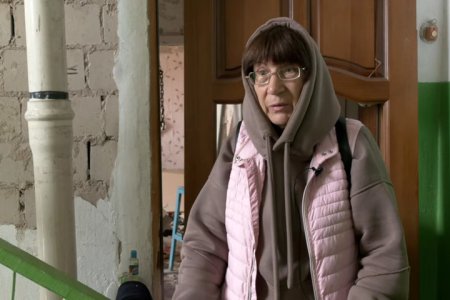
Vadym Kutsenko served in Ukraine’s Armed Forces. At the end of 2021 he was discharged. In February the next year, he came to Kupiansk on business. He found himself caught up in the Russian invasion. Someone informed on him, and he ended up in the infamous Kupiansk detention center. We’ve already written about this place of torture at the Kupiansk district police department. According to the Ukrainian Security Service (SBU), Russia’s occupation forces unlawfully detained about four hundred Ukrainian citizens there, even though the cells were intended to hold 140 at most.
— I served in the Anti-Terrorist Operation [in east Ukraine], but on 21 December 2021 I was discharged for health reasons. On 8 January 2022, I went to a hospital in Zaporizhzhia to receive treatment. Then, on 10 January, I went to Kupiansk to register at the labor exchange and replace my expired invalid ID document. I stayed at my former father-in-law's country cottage because nothing is decided in a day at our labor exchanges. I was at a dacha in Hlushkovka village near Kupiansk on 24 February 2022.
Vadym couldn’t leave: he would have been stopped as a former ATO soldier at the first checkpoint. He stayed on at the cottage, looking after the garden. They came for him in May.
— A white Sable vehicle marked with the letter Z arrived, and a Niva decorated in the same way ... They immediately hit me over the head with a rifle butt. The mark is still visible. I was put face down in the grass. I didn't count the boots, but one guard was standing next to me. The six others turned everything over: the house, the kitchen, the cellar, the barn, and the attic – everything apart from the beehives. They didn't find a thing. They tied my hands so tightly that for a month and a half afterwards there were dark marks on my wrists and my hands were swollen.
On the way back to Kupiansk, the Russians stopped at two more addresses, where they broke the doors down with a sledgehammer, looking for someone. All this time, Vadym was kept with his hands tied and a bag over his head.
— They brought me to the Kupiansk district police department and, to begin with, put me in cell No. 10. The reception was ‘wonderful’: they went to work with a heating pipe. A metal-plastic pipe a little over a meter long, and an officer's belt with a buckle. That was just the beginning. During the next couple of days, they gave me electric-shock treatment. No guesses as to where they attached the clamps... One on the ear, the second below the stomach. The sensation was so strong that I couldn’t see for a day and a half. Other prisoners were hung up with their hands in handcuffs behind them. There was a pull-up bar in one of the cells, and they hung people on it. Some of the prisoners lost consciousness there. There was constant swearing and terrible screams. I never heard screams like in the first days I was there. The guards, Zhenya and Vitaliy, were from Luhansk. They were second-rate, even by Russian standards: very evil people. Words can’t describe the pair of them...
— Did they interrogate you? What were they trying to find out?
— They asked about weapons and why I had been in the army. Why? Because I felt I had to. Those were the questions, no others. Where are the weapons? Which of the ATO soldiers do you know? They knew I was a soldier in the Anti-Terrorist Operation [2014-2018]: someone betrayed me.
— What were conditions like?
— I was held in cell No. 10. It was for two people, but nine of us were imprisoned there. Me, Vitya, Maksim... Some guys were detained for 10-15 days for breaking the curfew. Others were held there for a month. Then there was Yura Zhivitsa, a lieutenant colonel in the Ukrainian armed forces. He graduated from our rocket school [Kozhedub University of the Air Force, Kharkiv] and had been retired since 2005, but before that he worked in the military. He was detained for 55 days and was badly treated. They demanded certain flash drives [containing databases of Kupiansk conscripts]. He had destroyed them. They beat him severely and he almost died.
After that, military doctors came and treated those who were near death. There were times, however, when the guards forgot to close the ‘feeding troughs’ [flaps in the door], and we saw them take the bodies of those who died. They could not remove them unnoticed: four or five men dragged out a body on a sheet ...

— You were in hospital before the war. Could you take care of your health in captivity? Were any medicines available?
— There was a young nurse. She didn’t even know the names of the pills: which was used to treat what. She was about 26 and spoke Ukrainian; most likely she came from the Kupiansk district. No, they didn't give me any medicine. There was nobody to visit me. If only my father-in-law hadn’t been ill… The guard on duty would say: “Well if you die, you die. We’ll take out your body and throw it away, and that’ll be that.” Sometimes you could ask for something from your cellmates who had visitors. Even then, the guards hung on to those medicines and would not hand them out. You never knew if they would come or not, or whether they would give out the pills.
— Were you tortured all the time, or just for the first few days?
— Two or three times.
— And then they just kept you behind bars?
— They didn’t let me go. I asked them: “Why am I here?” but they weren't listening.
— At first, you said, the guards were from the Luhansk people’s republic. Did others replace them later?
— Later, the former employees of the local Kupiansk police branch started to take over as investigators and guards. It wasn’t the Luhansk people who took us for interrogation. I just sat there, but the newcomers were interrogated. They broke many of the young people. There was a guy who served in the National Guard and before the war came to Kupiansk on vacation. They tortured him with electricity. Those who gave interviews and urged the Ukrainian military to lay down their arms were released. Literally in 20 days. Even those who had served in the ATO. Someone was just a driver, but he spent a long time in solitary confinement. Others served in the assault troops, but they were released! Why? It means their conscience wasn’t clear.
— Did they force you to work?
— Young people painted bridges in colours of the Russian flag ... Once they took me out to work — but what kind of work could I do with swollen hands? Once we carried sandbags to cover the embrasures. I did what I could and poured sand. Those younger than me were constantly taken out to work, but, as a rule, we ATO officers were not taken anywhere else.
— How long were you in prison?
— 110 days. Vitaly and Maksim were taken out of our cell at 4 am. “Take your things and go!" We thought: “Maybe they will be released?” Only later we found out that the guys were alive and well. They were frightened on the way to be exchanged and didn't know where they were being taken.
— How did you get free?
— We were transferred to another cell. For two days, the ‘feeding troughs’ [door flaps] were closed entirely. We were left without food. Then, on the evening of the second day, prisoners began to bang on the door. We thought, well, now we will get through — they will beat everyone. It has always been like this: if someone was guilty somewhere, everyone else got into trouble, especially when the first shift was on duty — those same Zhenya, Vitalik, and Vova. But no one came. In our cell, there were mostly people of my age, and those who were younger who had health problems. Finally, however, sounder guys in cell three broke down the bunks and began knocking out the bars. They probably worked for three hours. All this time, we had one thought in our minds: now the patrol will hear us, and we’ll be done for. Then we heard them getting out.
They got out and climbed onto the roof of the center. They crossed the top to the second floor of the district police station. They broke the glass and went down the central staircase. There were old wooden doors in the temporary detention center. They broke those doors and found the keys. Cameras began to open.
Our documents were stored in the ‘duty room’. We began to sort through them and give them to others. Among us were many women, girls, and people whose business was ‘squeezed out’.
—They say there was a fire in the detention center?
—The guys who got out last set fire to everything they could. We thought they had no weapons in the center, but they found 20 machine-guns and ammunition. We think the Russians didn’t trust the locals and wouldn’t give them weapons. Only among the Luhansk and Donetsk fighters was there always one person with a gun. It turns out they also had machine guns.
— Did you find all of them in the detention center?
—The lads found them. Then they set everything on fire: the offices, the documents and the files.
— Were the Russians still in Kupiansk then?
—Yes. We didn't know what was going on. We were unaware that our side had launched an offensive. We were afraid Russians would search for us with dogs. That was the only thought in our heads. I returned to my father-in-law’s cottage, and there were Russians all around. I went to visit a friend. We had something to eat; then four people with machine-guns came in: “Give us something to eat!”
— No one checked your ID papers? Nobody cared that you had run away?
—No, they weren’t interested anymore. They were hungry. My friend asked: “Where are you from?” “Omsk ... Tomsk ...” “Why did you join the army?” “Conviction to be voided.” And they kept saying, “You're rich.” They all said the same thing: “You’re rich.”
Today the Kharkiv Human Rights Protection Group (KHPG) is providing Vadym Kutsenko with legal advice and assistance. Hopefully, the men who tortured Kutsenko and hundreds of others in Kupiansk will be brought to justice.



